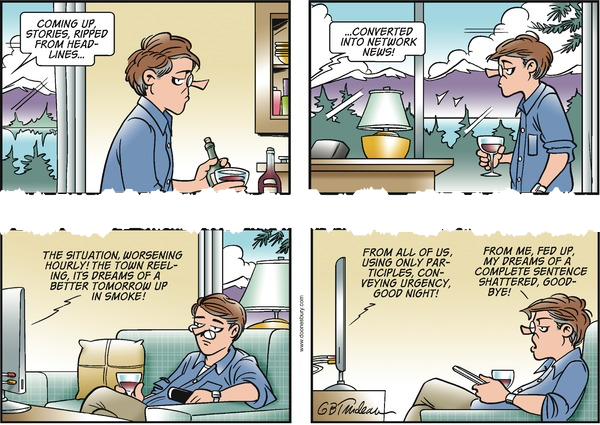Participles, conveying urgency?
« previous post | next post »
The first two and last two panels of today's Doonesbury:
The idea that short phrases convey urgency is a well-established principle of writing advice, e.g. here and here. But it's not obvious to me that either in headlines or in broadcast news, the use of present participles rather than tensed verbs is generally the more urgent-seeming choice:
The town reels, its dreams of a better tomorrow up in smoke!
The town reeling, its dreams of a better tomorrow up in smoke!
Pro: maybe noun-phrase fragments are more urgent than full clauses?
Con: present participles add an extra syllable.
Also, there are famous examples where a sense of urgency is associated with long run-on sentences, for example Molly Bloom's soliloquy from the last chapter of Ulysses:
. . . and the night we missed the boat at Algeciras the watchman going about serene with his lamp and O that awful deepdown torrent O and the sea the sea crimson sometimes like fire and the glorious sunsets and the figtrees in the Alameda gardens yes and all the queer little streets and the pink and blue and yellow houses and the rosegardens and the jessamine and geraniums and cactuses and Gibraltar as a girl where I was a Flower of the mountain yes when I put the rose in my hair like the Andalusian girls used or shall I wear a red yes and how he kissed me under the Moorish wall and I thought well as well him as another and then I asked him with my eyes to ask again yes and then he asked me would I yes to say yes my mountain flower and first I put my arms around him yes and drew him down to me so he could feel my breasts all perfume yes and his heart was going like mad and yes I said yes I will Yes.
Anyhow, I wonder what the distribution of phrase lengths and participial phrases in recent news broadcasts is — a good topic for someone's term paper!
For future reference, against eventual link rot, the whole Doonesbury strip is here.

smudgy said,
September 20, 2015 @ 8:08 am
Mirab, with sails unfurled!
Shaka, when the walls fell!
Sokath, his eyes uncovered!
Neal Whitman said,
September 20, 2015 @ 9:18 am
Geoff Nunberg has written about this, and calls it "Ing-lish." I noticed it in the news reports after Sept. 11, 2001, and it didn't let up for quite a while. Maybe it still hasn't, but I haven't paid as much attention. And maybe it began before 9/11/2001, but I wasn't watching as much news then, either?
[(myl) Indeed — the reference is "Cablespeak: I Seeing the News Today, Oh Boy!", NYT 12/8/2002.]
Melvyn Hunt said,
September 20, 2015 @ 11:28 am
This use of the present participle in news reports reminds me of a common practice in at least UK news reports of stating that some phenomenon is growing, as though it had momentum, which in general it hasn't. Made up but typical examples are: "There are growing calls for the minister to resign" and "Experts increasingly believe that the Gulf Stream will cease to flow" rather than "There have been calls for the minister to resign" and "Some experts have recently expressed the view that the Gulf Stream will cease to flow". The statement of a trend seems more immediate and interesting even if it's unfounded and often a bit longer. I suspect that it's the emphasis on continuity in present participial phrases that make them attractive, not brevity.
[(myl) Good point — I should have thought of that!]
Grammar Goof said,
September 20, 2015 @ 11:57 am
Is the present participle being used as the default verb form, especially by learners of English? All you have to do is successfully conjugate "be" in its various tenses, add the -ing to the end of any other verb, and you can pretty accurately get most ideas across.
John Walden said,
September 21, 2015 @ 1:44 am
I'm wondering if more people are using the continuous/progressive than before and I'm thinking that McDonalds may be having something to do with it.
Dropping the "I'm" from "I'm lovin it" and you've got an easy-to-learn English verb. Droppin the g helps.
pj said,
September 21, 2015 @ 2:20 am
Participial headlines sometimes need a bit of care over phrasing.
David Morris said,
September 21, 2015 @ 4:41 am
I have noticed a lot of Koreans using V-ing after auxiliary verbs and 'to'. At one point I recorded my wife saying "I want to making coffee. Could you boiling the kettle?" Today's lesson involved giving advice with 'should' and 'shouldn't'. I gave the sentence pattern and emphasised 'basic verb – no 's', no 'ed' and especially no 'ing'. One group produced: "Students shouldn't sleeping in class … smoking in class … talking to Korean" before I reminded them. They followed up with "use the cell-phone … late for class". Darn that verb 'be'.
DWalker said,
September 21, 2015 @ 2:06 pm
Yep, the verb "to be" is troublesome. I was once told that it's because the verb is so basic to life that in many languages it has nonstandard forms; it's one of the first verbs to be "created". It's an interesting conjecture.
Marc said,
September 22, 2015 @ 9:34 pm
Is Mike's attitude in the strip peevery?
This sort of Ing-lish on the news has bugged me for a long time. Maybe it bugs me because I perceive it as a conscious — and manipulative — choice by the TV producers, rather than spontaneous speech. It's like their tease technique to keep you tuned in until after the commercial break: "Stay tuned. What you don't know about your kitchen might kill you!"
I always felt it sounded like they were speaking in photograph captions, rather than telling a story.